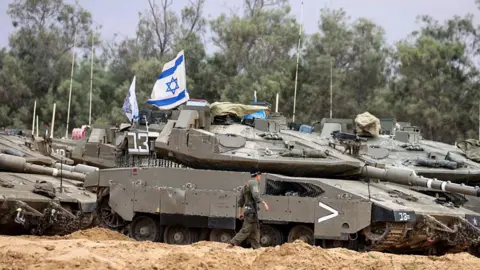Israeli army starts calling up reservists for planned expansion to Gaza offensive
 Getty Images
Getty ImagesThe Israeli military has begun calling up tens of thousands of reservists to "intensify and expand" its operations in Gaza.
The Israel Defense Forces (IDF) said it was "increasing the pressure" with the aim of returning hostages held in Gaza and defeating Hamas militants.
Critics say the recent military offensive, after a ceasefire broke down, has failed to guarantee the release of captives, and question Prime Minister Benjamin Netanyahu's objectives in the conflict.
Under the plan, the military said it would operate in new areas and "destroy all infrastructure" above and below ground.
The Israeli security cabinet is expected to approve a military expansion when it meets on Sunday.
International negotiations have failed to reach a new deal for a ceasefire and the release of the remaining 59 hostages being held by Hamas - 24 of whom are believed to be alive.
No Israeli hostages have been released since Israel resumed its offensive on 18 March after the collapse of a two-month ceasefire with Hamas.
Since then, Israel has seized large areas of Gaza, displacing hundreds of thousands of Gazans again.
Israel has said its aim was to put pressure on Hamas, a strategy that has included a blockade on humanitarian aid that has been in place for more than two months.
Aid agencies, who have reported acute shortages of food, water and medicines, have said this was a policy of starvation that could amount to a war crime, an allegation Israel rejects.
An expanded offensive will put more pressure on exhausted reservists, some of whom have been drafted five or six times since the war started, and renew concerns of the families of hostages, who have urged the government to reach a deal with Hamas, saying this is the only way to save those who are still alive.
The measure will also raise new questions about Netanyahu's real intentions in Gaza.
He has been frequently accused by the hostages' families and opponents of sabotaging negotiations for a deal, and of prolonging the war for political purposes, allegations he denies.
And almost 19 months into the war, he has not presented a day-after plan.
The military presented Netanyahu with its planned staged offensive in Gaza on Friday, according to local media.
In recent weeks, thousands of reservists have signed letters demanding Netanyahu's government stop the fighting and concentrate on reaching a deal to bring back the hostages.
On Saturday evening, there were fresh protests across Israel calling for an end to the conflict.
In Tel Aviv, the mother of a hostage who remains in captivity called it a "needless war".
The Israeli military said on Sunday that two more Israeli soldiers had been killed in Gaza.
Earlier on Sunday, a missile fired from Yemen by Iran-backed Houthi fighters landed near the main terminal of Israel's Ben Gurion airport. Netanyahu has vowed to retaliate.
The Houthis later responded to Israel's new plans for Gaza, saying they would impose an "aerial blockade" on Israel by repeatedly targeting its airports.
In Gaza, the Hamas-run health ministry said as of 11:05 local time (09:05 BST) on Sunday, 40 people had been killed in the previous 24 hours, and a further 125 injured.
The Israeli military launched a campaign to destroy Hamas in response to an unprecedented cross-border attack on 7 October 2023, in which about 1,200 people were killed and 251 others were taken hostage.
At least 52,535 Palestinians have been killed in Gaza during the ensuing war, according to the territory's Hamas-run health ministry.
Of those, 2,436 have been killed since 18 March, when Israel restarted its offensive in the Gaza Strip, the ministry said.
